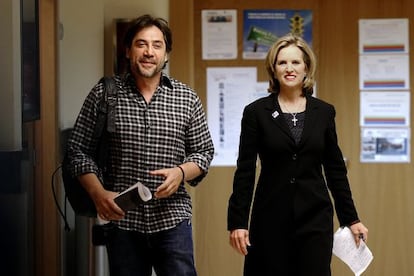Javier Bardem teams up with the Robert F. Kennedy Center
Actor joins Speak Truth to Power initiative in support of Sahrawi people

Oscar-winning actor Javier Bardem has joined the Robert F. Kennedy Center's Speak Truth to Power initiative, attending a press conference last week in Madrid with the former US Attorney General's daughter, Kerry, to raise awareness of the educational project in Spain.
Speak Truth to Power is aimed at 15 to 18-year-old students, and based on Kerry Kennedy's eponymous book, consisting of interviews discussing the issue of human rights with more than 50 leading global figures, including Desmond Tutu and the Dalai Lama.
Kennedy said the initiative aims to encourage young people to become more involved in safeguarding democracy and defending respect for human life and dignity. Bardem said that he approached Kennedy last year to ask if he could help with Speak Truth to Power, as well as using it as a platform to raise awareness about the plight of the people of Western Sahara.
In February, Kennedy and Bardem held a press conference in Washington to highlight the actor's support for the Sahrawis, and the need to include a human rights mandate in the United Nations mission in Western Sahara, which Bardem noted is the only UN country operation in the world that does not have a mandate to monitor human rights.
Kennedy and Bardem held a press conference in Washington to highlight the actor's support for the Sahrawis,
"This mandate has been repeatedly blocked by certain Security Council members. This is an astonishing and unacceptable omission," he said
"In just two months, the mandate of the United Nations Mission for the Referendum in Western Sahara (MINURSO) is up for renewal. Javier Bardem and I have teamed up to raise awareness for the need to include a human rights mandate in MINURSO," added Kennedy, who has visited Western Sahara. "We witnessed firsthand the overwhelming presence of security forces and violations of basic human and civil rights that Sahrawi citizens live with every day."
Bardem produced and appeared in Sons of the Clouds, a 2012 documentary about Western Sahara that explains how Spain abandoned its former colony in 1975, prompting Morocco to immediately colonize the vast swathe of mineral-rich desert to its south that also borders Algeria and Mauritania, leading to an exodus of up to 200,000 people, many of who still live in refugee camps in Algeria.
Morocco has used its strategic importance as a moderate Arab state to stall attempts to find a peaceful solution and has built an enormous wall across the desert, cutting the territory in two, while repeatedly refusing a UN mandated referendum on independence.
Bardem used last Thursday's press conference to reiterate his attack on Morocco's policy of suppressing the people of Western Sahara's fight for self-determination. In the film, diplomats frankly describe the brutal military clampdown, as well as Morocco's policy of moving thousands of colonists into the region.
In UN-mediated talks, Rabat has tried to convince the Polisario Front, which represents the Sahrawi people, to accept its plan for Western Sahara to be an autonomous part of Morocco. Polisario instead proposes a referendum among ethnic Sahrawis that includes an option of independence. "The people of the Western Sahara are suffering in refugee camps where they have been forgotten for decades," said Bardem, who accuses France, Spain, and the United States of helping Morocco to block a referendum for their own "geo-strategic" and "economic" interests.
Tu suscripción se está usando en otro dispositivo
¿Quieres añadir otro usuario a tu suscripción?
Si continúas leyendo en este dispositivo, no se podrá leer en el otro.
FlechaTu suscripción se está usando en otro dispositivo y solo puedes acceder a EL PAÍS desde un dispositivo a la vez.
Si quieres compartir tu cuenta, cambia tu suscripción a la modalidad Premium, así podrás añadir otro usuario. Cada uno accederá con su propia cuenta de email, lo que os permitirá personalizar vuestra experiencia en EL PAÍS.
¿Tienes una suscripción de empresa? Accede aquí para contratar más cuentas.
En el caso de no saber quién está usando tu cuenta, te recomendamos cambiar tu contraseña aquí.
Si decides continuar compartiendo tu cuenta, este mensaje se mostrará en tu dispositivo y en el de la otra persona que está usando tu cuenta de forma indefinida, afectando a tu experiencia de lectura. Puedes consultar aquí los términos y condiciones de la suscripción digital.








































